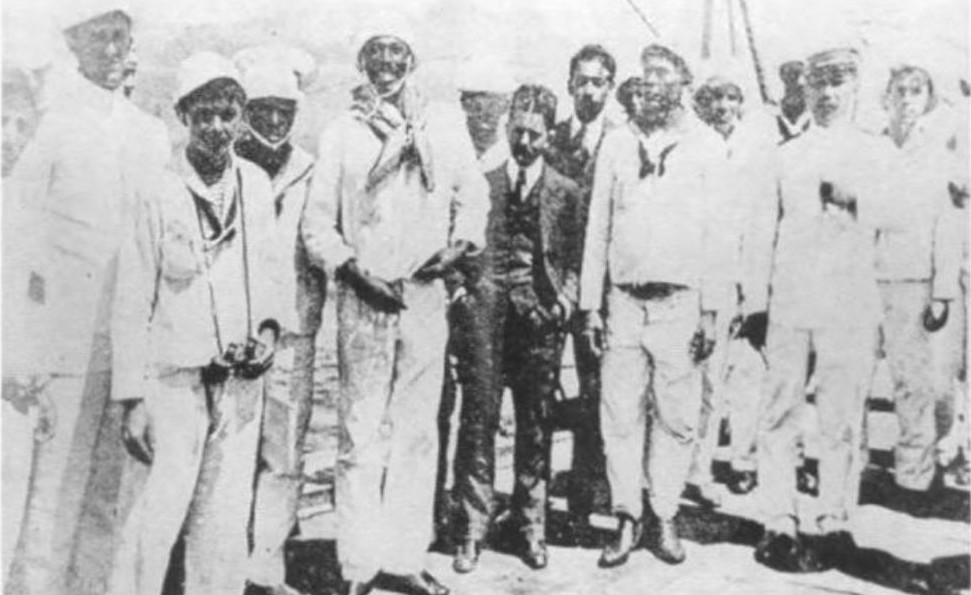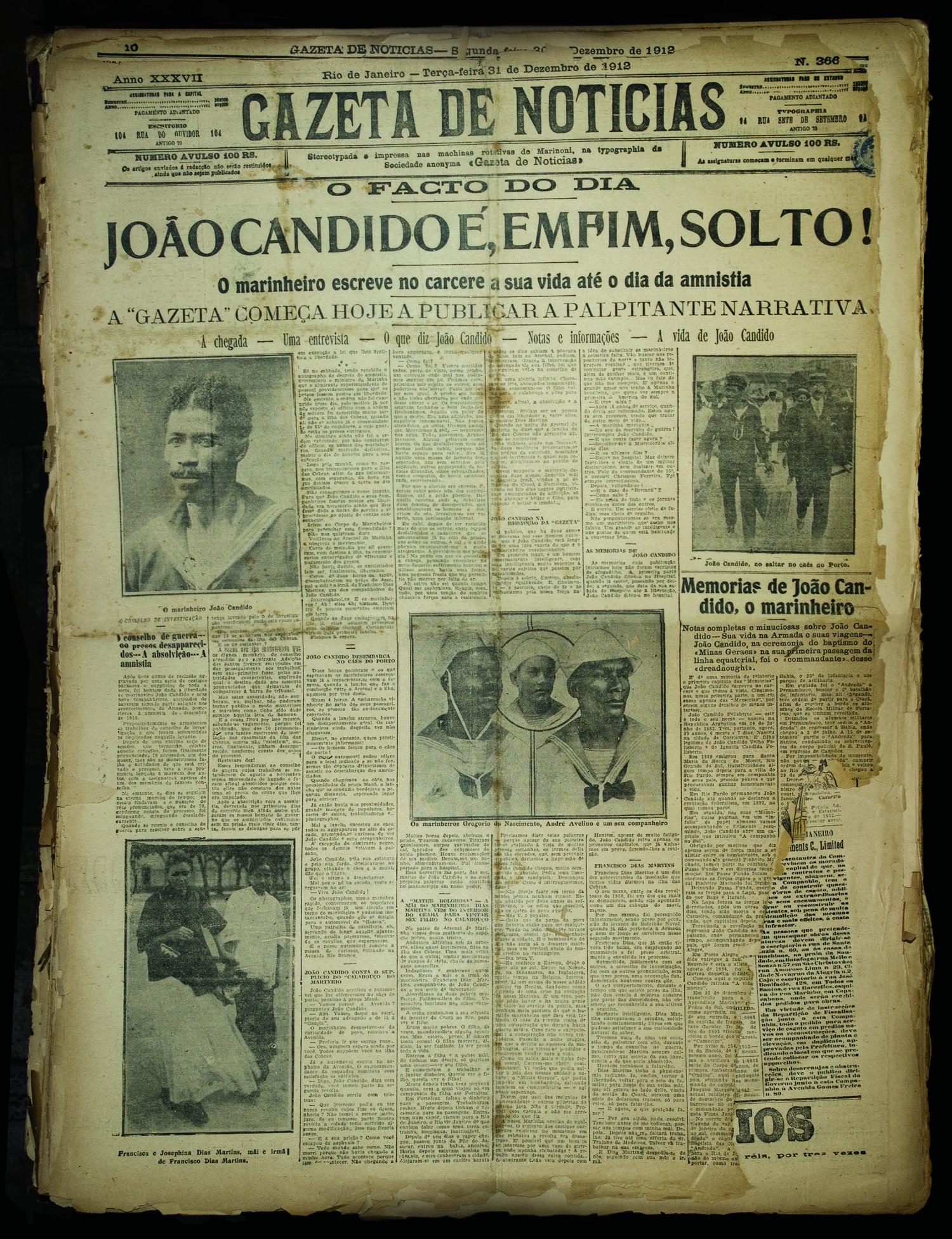João Cândido Felisberto on:
[Wikipedia]
[Google]
[Amazon]
João Cândido Felisberto (24 June 1880 – 6 December 1969) was a Brazilian sailor, best known as the leader of the 1910 " Revolt of the Lash". His name was sometimes given as simply "João Cândido" or "Jean Candido" in foreign articles.
 The conditions for Brazilian sailors at the time were harsh, and being black, Felisberto suffered prejudice from the white officers in the Brazilian Navy. Several Brazilian sailors had been sent to
The conditions for Brazilian sailors at the time were harsh, and being black, Felisberto suffered prejudice from the white officers in the Brazilian Navy. Several Brazilian sailors had been sent to  In November 1910, the flogging of a sailor, against Navy regulations (250 strokes instead of the allowed 25 strokes), was a contributing factor to the revolt, known in Brazil as "Revolta da Chibata" (" Revolt of the Lash"). Sailors took control of two Brazilian battleships, ''Minas Geraes'' and ''São Paulo'', both built in
In November 1910, the flogging of a sailor, against Navy regulations (250 strokes instead of the allowed 25 strokes), was a contributing factor to the revolt, known in Brazil as "Revolta da Chibata" (" Revolt of the Lash"). Sailors took control of two Brazilian battleships, ''Minas Geraes'' and ''São Paulo'', both built in
Afro-Latin America, 1800-2000
OUP USA, . A statue of João Cândido Felisberto was erected in Rio de Janeiro. His life was portrayed in a movie, '' Memórias da Chibata'' (''Chibata Memories''), in 2006, retelling his fight against the Lash with actors, and a documentary called ''Cem Anos Sem Chibata'' (''Cem Anos Sem Chibata''), a coproduction with EBC, in 2010. Both productions were written and directed by Marcos Manhães Marins.
Early life
João Cândido Felisberto was born in Encruzilhada do Sul,Rio Grande do Sul
Rio Grande do Sul (, ; ; "Great River of the South") is a Federative units of Brazil, state in the South Region, Brazil, southern region of Brazil. It is the Federative units of Brazil#List, fifth-most populous state and the List of Brazilian s ...
, to a poor Afro-Brazilian
Afro-Brazilians (; ), also known as Black Brazilians (), are Brazilians of total or predominantly Sub-Saharan African ancestry. Most multiracial Brazilians also have a range of degree of African ancestry. Brazilians whose African features are mo ...
family 24 June 1880. His father and mother were former slaves
Slavery is the ownership of a person as property, especially in regards to their labour. Slavery typically involves compulsory work, with the slave's location of work and residence dictated by the party that holds them in bondage. Enslavemen ...
. He entered the Brazilian Navy
The Brazilian Navy () is the navy, naval service branch of the Brazilian Armed Forces, responsible for conducting naval warfare, naval operations.
The navy was involved in War of Independence of Brazil#Naval action, Brazil's war of independence ...
in 1894 at the age of 13.
 The conditions for Brazilian sailors at the time were harsh, and being black, Felisberto suffered prejudice from the white officers in the Brazilian Navy. Several Brazilian sailors had been sent to
The conditions for Brazilian sailors at the time were harsh, and being black, Felisberto suffered prejudice from the white officers in the Brazilian Navy. Several Brazilian sailors had been sent to Newcastle-Upon-Tyne
Newcastle upon Tyne, or simply Newcastle ( , Received Pronunciation, RP: ), is a City status in the United Kingdom, cathedral city and metropolitan borough in Tyne and Wear, England. It is England's northernmost metropolitan borough, located o ...
in England during the two-year period taken for the construction of the dreadnought
The dreadnought was the predominant type of battleship in the early 20th century. The first of the kind, the Royal Navy's , had such an effect when launched in 1906 that similar battleships built after her were referred to as "dreadnoughts", ...
. Felisberto arrived there in September 1909 and left in January 1910 as part of the crew of the newly commissioned ''Minas Geraes''. It was while experiencing the living conditions and increased freedoms of Newcastle that Felisberto realised how unacceptable conditions in the Brazilian Navy were.
The sailors had many secret meetings in Rio de Janeiro, planning a strategy to stop the corporal punishment still imposed in the new Navy, which had received two new modern battleships in 1910. In November 1910, the flogging of a sailor, against Navy regulations (250 strokes instead of the allowed 25 strokes), was a contributing factor to the revolt, known in Brazil as "Revolta da Chibata" (" Revolt of the Lash"). Sailors took control of two Brazilian battleships, ''Minas Geraes'' and ''São Paulo'', both built in
In November 1910, the flogging of a sailor, against Navy regulations (250 strokes instead of the allowed 25 strokes), was a contributing factor to the revolt, known in Brazil as "Revolta da Chibata" (" Revolt of the Lash"). Sailors took control of two Brazilian battleships, ''Minas Geraes'' and ''São Paulo'', both built in England
England is a Countries of the United Kingdom, country that is part of the United Kingdom. It is located on the island of Great Britain, of which it covers about 62%, and List of islands of England, more than 100 smaller adjacent islands. It ...
, as well as two other major warships. Their demands included the abolition of torture as a form of punishment and improved living conditions in the Brazilian Navy. Felisberto was the leader of the movement. The new Brazilian president, Hermes da Fonseca, promised the end of "Chibata" and approved an amnesty, but the government later went back on this promise. In the revolt's aftermath Felisberto and many of his fellow mutineers were either arrested, tortured or murdered in prison. Felisberto himself was tortured, and also contracted tuberculosis
Tuberculosis (TB), also known colloquially as the "white death", or historically as consumption, is a contagious disease usually caused by ''Mycobacterium tuberculosis'' (MTB) bacteria. Tuberculosis generally affects the lungs, but it can al ...
, but he recovered after some months and was eventually released. The Brazilian press nicknamed him "Almirante Negro", or the "Black Admiral", for his actions.
Later life
After his release, he sank into poverty and experienced discrimination, working in a harbor on a very low salary. He was arrested again in 1930 but was soon released. In 1933 he joined the integralist movement. In 1938 anintegralist uprising
The Integralist Uprising () was a failed coup d'état, coup by the Brazilian Integralist Action (AIB) against the government of president Getúlio Vargas during the Estado Novo (Brazil), Estado Novo in Brazil. The AIB was created due to the radi ...
was easily crushed by the Brazilian military, with fewer than twenty deaths, and the group was outlawed.
With Brazil at war with the fascist
Fascism ( ) is a far-right, authoritarian, and ultranationalist political ideology and movement. It is characterized by a dictatorial leader, centralized autocracy, militarism, forcible suppression of opposition, belief in a natural soci ...
Axis powers
The Axis powers, originally called the Rome–Berlin Axis and also Rome–Berlin–Tokyo Axis, was the military coalition which initiated World War II and fought against the Allies of World War II, Allies. Its principal members were Nazi Ge ...
from 1942 onwards, integralism became a small and powerless movement. Germany's defeat in 1945 reduced integralism to very little importance. João Cândido Felisberto said in 1968 that he was proud to be an integralist. After living in ostracism in the Brazilian city of São João de Meriti
São João de Meriti () is a Brazilian municipality in the state of Rio de Janeiro. Its historical name was São João do Rio Meriti. Its population was 440,962 inhabitants in 2022. It is located in the region of Baixada Fluminense, having 34.99 ...
and being persecuted by the Brazilian Navy, he died of cancer
Cancer is a group of diseases involving Cell growth#Disorders, abnormal cell growth with the potential to Invasion (cancer), invade or Metastasis, spread to other parts of the body. These contrast with benign tumors, which do not spread. Po ...
on 6 December 1969 in Rio de Janeiro
Rio de Janeiro, or simply Rio, is the capital of the Rio de Janeiro (state), state of Rio de Janeiro. It is the List of cities in Brazil by population, second-most-populous city in Brazil (after São Paulo) and the Largest cities in the America ...
, at the age of 89.
Legacy and statue
The Lash Uprising, which was sparked by the Brazilian Navy's use of torture, ended with Felisberto and many of his followers imprisoned and tortured. The revolt was cited later by labor organizers as an "heroic example of worker struggle".Andrews, George ReidAfro-Latin America, 1800-2000
OUP USA, . A statue of João Cândido Felisberto was erected in Rio de Janeiro. His life was portrayed in a movie, '' Memórias da Chibata'' (''Chibata Memories''), in 2006, retelling his fight against the Lash with actors, and a documentary called ''Cem Anos Sem Chibata'' (''Cem Anos Sem Chibata''), a coproduction with EBC, in 2010. Both productions were written and directed by Marcos Manhães Marins.
References
Notes
Sources
* (in Portuguese) {{DEFAULTSORT:Candido Felisberto, Joao People from Rio Grande do Sul Deaths from cancer in Rio de Janeiro (state) 1880 births 1969 deaths 20th-century Brazilian military personnel Brazilian mutineers Brazilian rebels